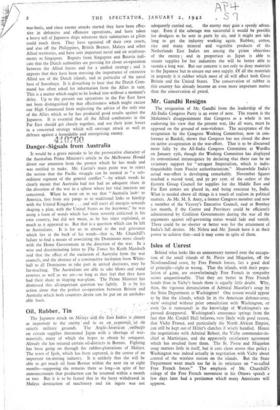Isles of Unrest
Behind what looks like an unnecessary turmoil over the occupa- tion of the small islands of St. Pierre and Miquelon, off the Newfoundland coast, by Free French forces, lies a good deal of principle—right or wrong. That the islands, with their popu- lation of 4,000, are overwhelmingly Free French in sympathy seems unquestionable. That they are better in Free French hands than in Vichy's hands there is equally little dOubt. Why, then, the vigorous denunciation of Admiral Muselier's coup by the State Department at Washington? One reason would appear to be that the islands, which lie in the American defence-zone, -,W,ete" oc.upied without prior consultation with Washington, or even • (as is rumoured) in the knowledge of Washington's ex- pressed disapproval. Washington's annoyance springs from the fact that Mr. Cordell Hull believes, very likely with good reason, that Vichy France, and particularly the North African Empire, can still be kept out of Hitler's clutches if wisely handled. Hence the negotiations with Admiral Robert, the Vichy commander-in- chief at Martinique, and the apparently satisfactory agreement which has resulted from them. The St. Pierre and Miquelon coup matters little in itself, but it cuts clean across that policy ; Washington was indeed actually in negotiation with Vichy about control of the wireless station on the islands. But the State Department went much too far in its strictures on " so-called Free French forces." The emphasis of Mr. Churchill's eulogy of the Free French movement in his Ottawa speech a few days later had a pertinence whiclf many Americans will approve.


























 Previous page
Previous page